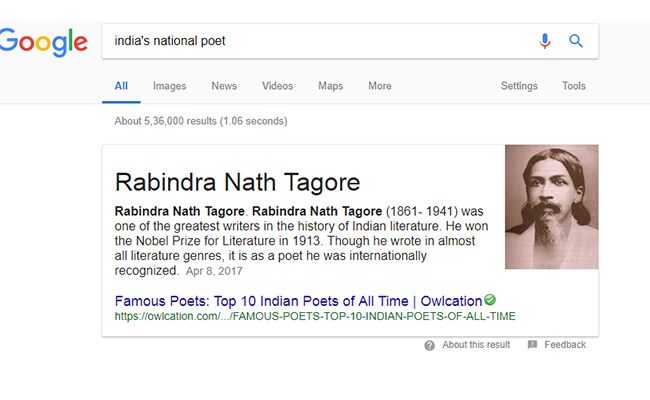
New Delhi:
On the 157th birth anniversary of Rabindranath Tagore, Google is throwing up a very strange result. The top result for "India's national poet" is sporting a photograph of Shri Aurobindo, yogi and philosopher and nationalist, who also happened to be a poet.
The other similarities between the two men -- they were both from Bengal and lived around the same time. And they both had long, flowing beards
Clicking onto Shri Aurobindo's image leads to more of his pictures. On the pages, he is identified by name.
Google's blooper has caused much mirth on social media, especially in Bengal, where Tagore's birth anniversary is celebrated with a fervor that borders on religious.
 A number of jokes are doing the rounds on WhatsApp. In one of these, a Tagore acolyte has paraphrased the biblical line, "Forgive them, for they know not what they do" and simply written in Bengali... "eder khoma kore dio".
A number of jokes are doing the rounds on WhatsApp. In one of these, a Tagore acolyte has paraphrased the biblical line, "Forgive them, for they know not what they do" and simply written in Bengali... "eder khoma kore dio".
Rabindranath Tagore, born in Kolkata in 1861, had never been officially designated India's national poet. But the Nobel laureate reshaped Bengal's literature, music and art and is regarded as one of the outstanding creative figures of the age.
His Gitanjali (song offerings), written in 1912 for which he received the Nobel prize for literature, has been translated into more than a dozen European languages.
He was also awarded a knighthood in 1915, but he rejected it four years later in protest against the massacre at Punjab's Jallianwallah Bagh, during which British trooped led by General Dyer had opened fire of thousands of unarmed Indians.
The other similarities between the two men -- they were both from Bengal and lived around the same time. And they both had long, flowing beards
Clicking onto Shri Aurobindo's image leads to more of his pictures. On the pages, he is identified by name.
Google's blooper has caused much mirth on social media, especially in Bengal, where Tagore's birth anniversary is celebrated with a fervor that borders on religious.

Rabindranath Tagore, born in Kolkata in 1861, had never been officially designated India's national poet. But the Nobel laureate reshaped Bengal's literature, music and art and is regarded as one of the outstanding creative figures of the age.
His Gitanjali (song offerings), written in 1912 for which he received the Nobel prize for literature, has been translated into more than a dozen European languages.
He was also awarded a knighthood in 1915, but he rejected it four years later in protest against the massacre at Punjab's Jallianwallah Bagh, during which British trooped led by General Dyer had opened fire of thousands of unarmed Indians.
Track Latest News Live on NDTV.com and get news updates from India and around the world

